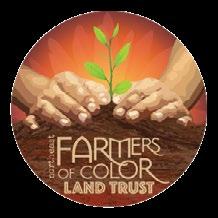










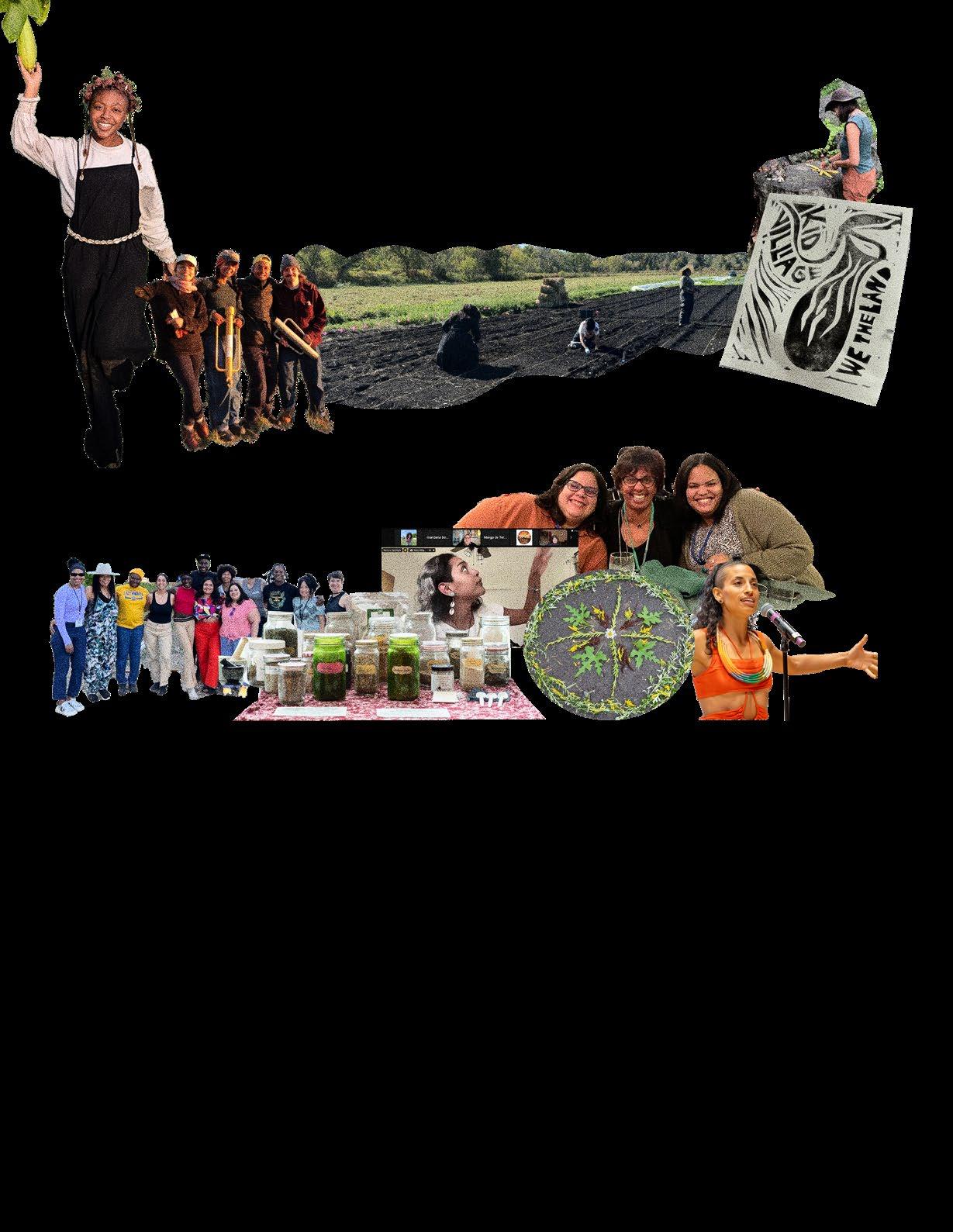
“Rarely, i f ever, are any of us healed i n i s olation. . . ”
Reflecting on 2024, we find ourselves at the intersection of deep personal and collective transformation. This year, the work of the Northeast Farmers of Color (NEFOC) Land Trust continued to expand in powerful ways, rooted in the liberatory movement work that inspires and guides us. Our efforts, grounded in the dreams of our ancestors, center on land justice, reparations, and community-led sovereignty for Black, Indigenous, and people of color (BIPOC) farmers and land stewards. It has been a year of growth, healing, and reflection, as we have navigated uncertainty and celebrated moments of profound connection and vision
For me, personally, 2024 was a year marked by healing from cancer—a diagnosis that I came to see as a symptom of the overproduction culture that white supremacy perpetuates. This experience, while deeply personal, mirrored the organizational work we have done this year. We are learning to move more slowly and intentionally, drawing on the powerful medicines of conflict transformation and community care. In my absence, the incredible team at NEFOC— our Co-Directors, staff, and partners—stepped up with grace and resilience, ensuring our mission continued flourishing. Together, we are healing from the systems that perpetuate overwork and exploitation, both on our bodies and on the land.
“ . . . He a l ing is an act of c o m munion. ”
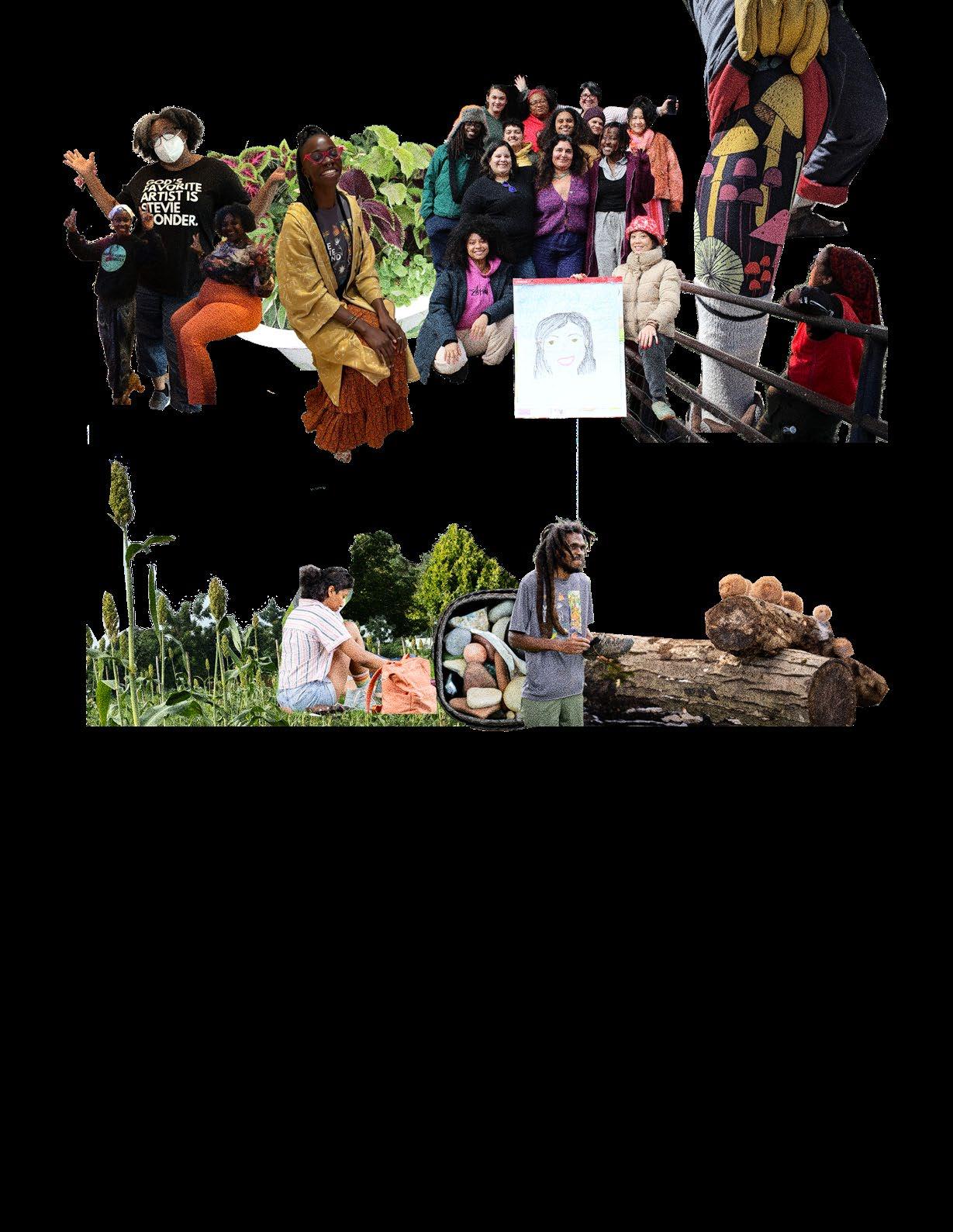
2024 was a year of profound healing and growth for NEFOC. As we step into 2025, we do so with a renewed sense of purpose and connection. Our work is rooted in the belief that land justice is not just about reclaiming land—it is about healing the relationships between people, land, and culture. It is about envisioning a future where care, reciprocity, and community are at the center of all that we do. We have so much to celebrate- serving the communities we belong to and are accountable to, starting new land projects, building communities of practice in the spirit of celebratory liberation, redistributing resources, standing in the face of oppression and violence, and ensuring that BIPOC farmers have access to all we need for our families, communities, land, and non-humans we share this world with to thrive and regenerate.
We extend our deepest gratitude to the donors, foundations, and supporters who have stood with us this year, making our work possible. Your contributions are more than financial—they are acts of solidarity, joining us as partners in the liberation of land and the repair of oppressive ancestral legacies. Together, we are reclaiming what has been taken and building a future rooted in justice, reciprocity, and healing for our communities and the land. Your unwavering commitment fuels this transformative movement, and we honor you for walking this path with us.
Nia:wen’koa, Stephanie Morningstar Executive Director & Relationships and Reciprocity Program Co-director
Our Values & Principles
livin g , I believ
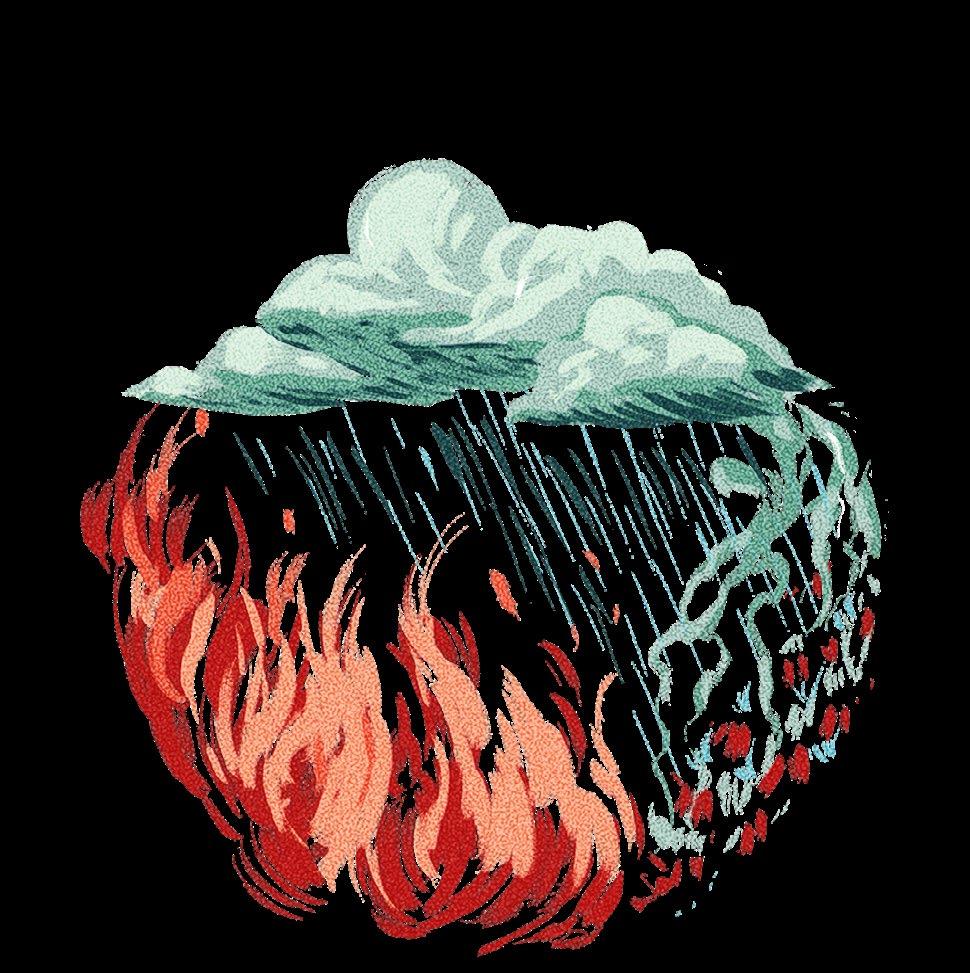
Ibelieve in the sweat o f l ove and the fire oftruth. ”
–Assata Shakur

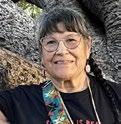
Beverly Little Thunder Member of Board of Directors
She/Her

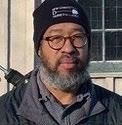
Robert Chang Policy & Advocacy Co-Director
He/Him

Mandana Boushee Water Bearer; Relationships and Reciprocity Program
Joon/She

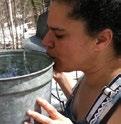
Stephanie Morningstar Relationships and Reciprocity Program Co-Director
She/Her
Kenya Lazuli Co-Director of Reparations Program
She/They
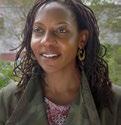
Onika Abraham Lee Member of Board of Directors
She/Her

Ysanet Batista
Land Network Services Coordinator
She/Ella

Leonardo Figueroa Helland Member of Board of Directors
He/Him/Le’/El
“COLLABORATION HAS NO HIERARCHY. THE SUN COLLABORATES WITH SOIL TO BRING FLOWERS TO THE EARTH.”
–Amit Ray


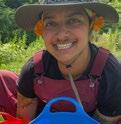
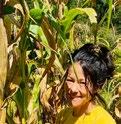




2024 found us welcoming a new leadership cycle within our organizational community through our recently appointed Advisory Board members, Beverly Little Thunder, Leonardo Figueroa Helland, and Onika Abraham Lee. We are excited and humbled to be guided and inspired by this incredible team of visionary leaders, as we continue the strategic and integral work of shaping The Northeast Farmers of Color Land Trust’s long-term impact within the land, racial, and environmental justice movements.
In 2024, our collective experienced significant growth, with many long-anticipated projects finally coming to fruition. As we look ahead to 2025, we feel strengthened by our ongoing journey in deepening our relationships and bonds as an ever-expanding team. Through our land stewardship projects grounded in reciprocity, policy advocacy, holistic technical assistance, and strategic partnerships, we are dedicated to supporting BIPOC farmers and promoting sustainable, regenerative land practices for future generations.
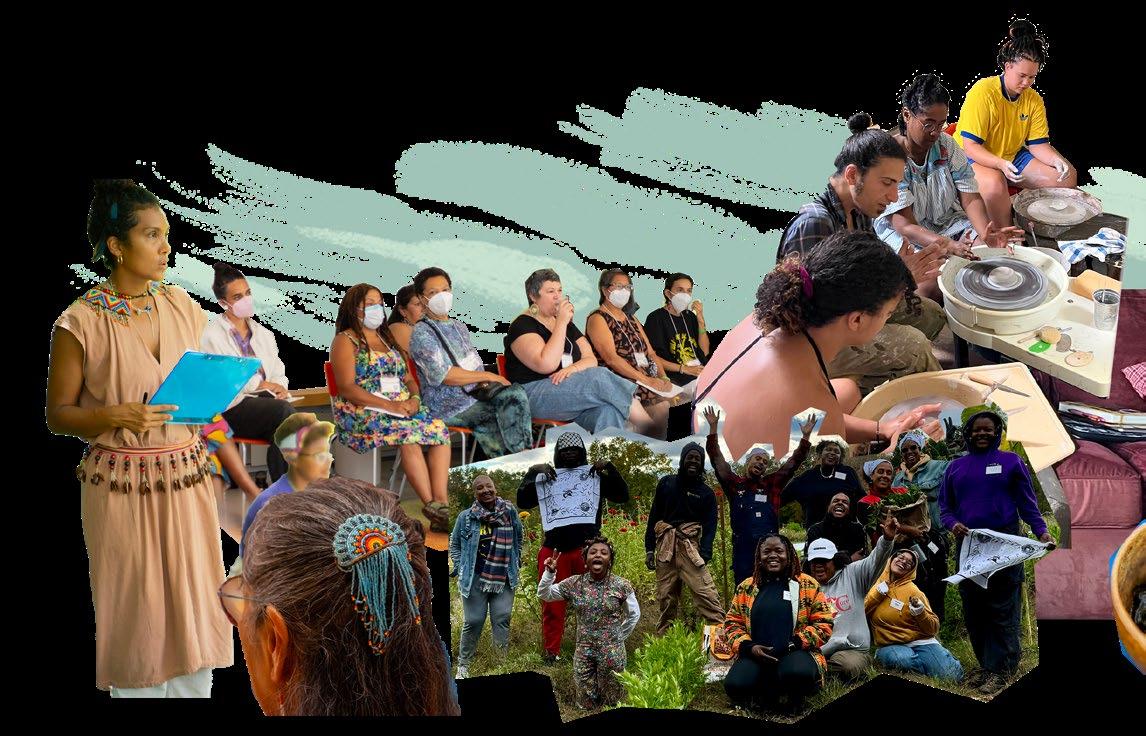
AGRI-CULTURA COOPERATIVE • BLACK AND ARAB MIGRANT SOLIDARITY ALLIANCE BLACK DIRT FARM COLLECTIVE • BLACK FARMER FUND • BLACK FARMERS UNITED OF NEW YORK STATE • BOMAZEEN LAND TRUST • BRAIDING SEEDS FELLOWSHIP • BUFFALO FOOD EQUITY NETWORK • BUFFALO FREEDOM GARDENS • BUFFALO GO GREEN URBAN FRUITS & VEGGIES • CENTER FOR WHOLE COMMUNITIES • CONSCIOUS HOMESTEAD VT • CORBIN HILL FOOD PROJECT • CT BIPOC FOOD NETWORK • FARM SCHOOL NYC FOOD FOR THE SPIRIT • HEAL FOOD ALLIANCE • KITCHEN TABLE ADVISORS • KUNSIKEYA TAMAKOCE • LA SEMILLA FOOD CENTER • LIBERATING INVESTMENT IN THE FOOD & FARM ECOSYSTEM (LIFE) • NATIONAL BLACK FOOD AND JUSTICE ALLIANCE • NATIVE LAND CONSERVANCY • MOON AND STARS VT • OPERATION SPRING PLANT • RACIAL EQUITY & JUSTICE • SOUL FIRE FARM • UPROOTED AND RISING • VERMONT RELEAF COLLECTIVE • WILDSEED COMMUNITY FARM AND HEALING VILLAGE
2024 was a year marked by national and global economic hardship, increasing political conflict, and climate-fueled environmental disasters. As we grapple with the devastating implications of the climate crisis and the uptick in a scarcitydriven cultural divide, we know that these implications affect land workers of color at exponential rates. More than ever, we
are grateful for our shared collaborations and partnerships within our ecosystem of farmers, advocates, earth lawyers, policymakers, Indigenous activists, seed keepers, food system warriors, and all who are committed to building up equitable food systems and land access. We can mobilize and endure the relentless heavy lifting of the times wholly due to our precious
and interconnected collaborations. These kernels of relationship are the vital seeds fueling our resistance and reflect the collective fire we tend together in defiance of economic imperialism, settler colonial violence, ecosystem degradation, and a deliberate on going food apartheid.
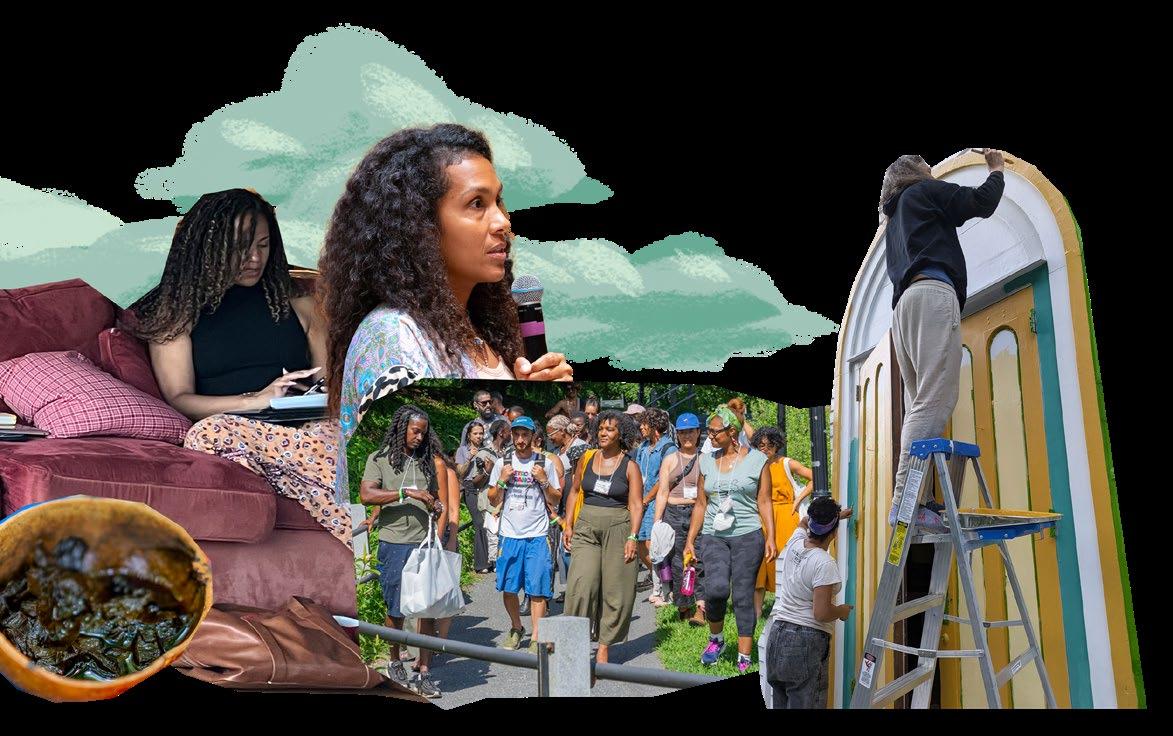
CHESTER AGRICULTURAL CENTER • COOPERATIVE DEVELOPMENT INSTITUTE
COOPERATIVE FOUNDERS OF THE NORTHEAST •CORNELL SMALL FARMS PROGRAM
CULTIVATING COMMUNITY EARTH LAW CENTER • CULTIVEMOS • DEPARTMENT OF INTEGRATIVE AND GLOBAL STUDIES AT WORCESTER POLYTECHNIC INSTITUTE
ELMINA B. SEWALL FOUNDATION • EARTH LAW CENTER • FARM AID • GLYNWOOD GROW FOOD NORTHAMPTON • HARVARD LAW TRANSACTIONAL CLINIC • HENRY P. KENDALL FOUNDATION • KALLIOPEIA FOUNDATION • NATIONAL YOUNG FARMERS COALITION • NESAWG • NEW SCHOOL - ENVIRONMENTAL POLICY AND SUSTAINABILITY MANAGEMENT • NOVO FOUNDATION • PACE LAW SCHOOL
FOOD & BEVERAGE CLINIC • PASA SUSTAINABLE AGRICULTURE • PATAGONIA PROVIDENCE FARM COLLECTIVE • RAFI-USA • SEEDING POWER VERMONT • SMITH COLLEGE SUFFOLK LAW HUMAN RIGHTS AND INDIGENOUS PEOPLE’S CLINIC • SUFFOLK LAW TRANSACTIONAL CLINIC • VERMONT LAND TRUST • VERMONT LAW SCHOOL CENTER FOR AGRICULTURE AND FOOD SYSTEMS • WHY HUNGER
“No road is long with good company.” — Turkish Proverb
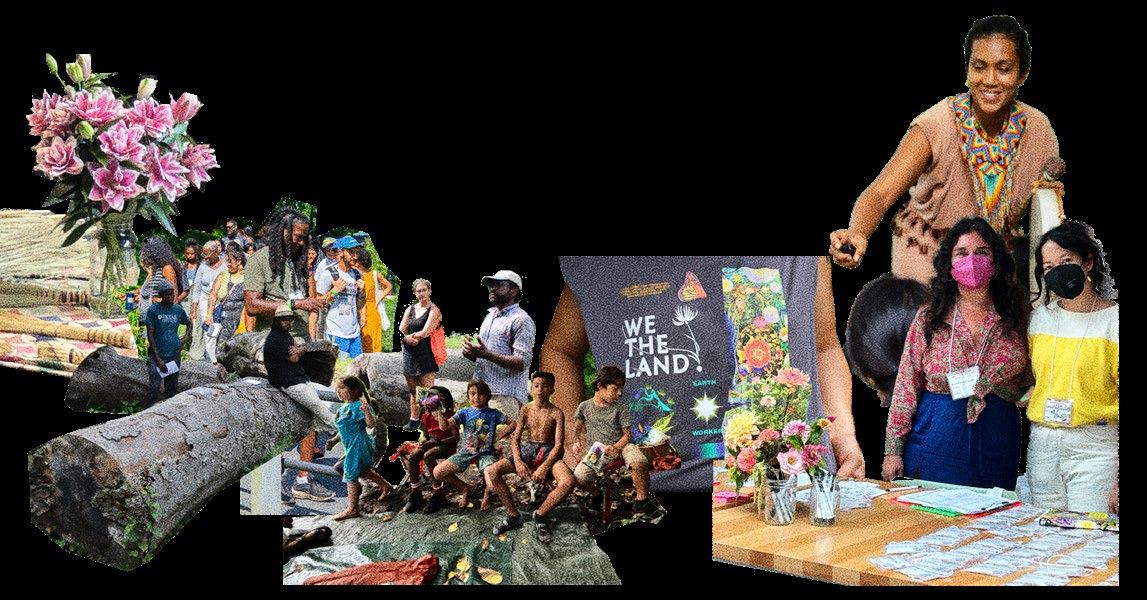
On an auspicious weekend in early August, over 350 Indigenous, Black, Latinx, Asian, SWANA & PoC earth workers, land stewards, and farmers gathered together at Smith College for NEFOC’s inaugural We the Land! gathering.
We the Land!, NEFOC’s first in-person gathering since 2019 marked a significant moment in our community’s journey toward reclaiming land and food sovereignty in the Northeast. The conference was more than just an event—it was a sacred gathering that honored our ancestors’ dreams for regenerative farming, human habitat, ceremony, native species ecosystem restoration, and cultural preservation.
The weekend brought together a rich tapestry of voices grounded in NEFOC’s vision of advancing permanent and secure land tenure for BIPOC farmers. Over three days, we engaged in knowledge exchange, grassroots organizing, celebration, and ceremony, all aimed at breaking the isolation often felt by farmers of color in the Northeast. We came together to reimagine what it means to be in Right Relationship with the land, healing generational trauma, catalyzing reparations for our communities,
and building regenerative systems with our future generations in mind.
The work leading up to the gathering was held with deep care and intention. Our Advisory Council, composed of knowledge holders from Indigenous, Black, and Diasporic communities, co-defined and shaped the best practices and intentions of this gathering. We owe immense gratitude to Advisory Council members Amanda David, Leonardo Figueroa-Helland, Mali Obomsawin, and xochicoatl bello for their wisdom, time, and stewardship of this community. Their guidance and expression of community care helped weave the vision of We the Land! into a powerful convergence of healing, organizing, and celebration.
Steeped in our radical tenets of care, We the Land! was an affirmation that conferences organized For Us, By Us are greatly desired and needed. We are so grateful to all of our interwoven communities, partners, and friends who gathered with us, making We the Land! possible and fruitful. We look forward to synthesizing all of the feedback we gleaned from the event to craft an even more resonant experience in 2026!
“We the land was the best effort I’ve seen to connect BIPOC and marginalized groups throughout New England to bring together ideas. Us in New England are usually left out due to the idea that we don’t exist, but We the Land! provided a voice and community showing otherwise.”
- Reggy St Fortcolin, participant
“We the Land! was an exceptionally engaging event that
was both stimulating and filled with friendly community. I learned a lot of detailed knowledge and made a few new friends along the way.”
- Lovell Johnson, participant
“For me, being able to attend We the Land! was very special, since exchanging Mayan ancestral knowledge is something that I do with great enthusiasm. Above all I like to learn from people who
have lived experiences that in the course of life have been used to change their lives or to help others to change their way of life; from culture, agriculture, medicine, use of plants, and community organizing among others. There is empowerment in terms of this knowledge exchange, and I trust that the tools shared with each other will be applied in our lives.”
- Sabina Cecilia Ajcot Sosof, We the Land! Teacher
“We the Land! brought me to a world where I know spiritually we all need to lean into as we nurture ourselves and earth. The music was so fun, the food was delicious, the workshops were so informative, and the intentions were impactful. Thank you for calling us back home and giving us tools to go back out into the world.”
- Noemi Saafyr Paz, participant

A pre-conference farm tour at local community garden and farm, Grow Food Northampton led by Piyush Labhsetwar, an agroforestry farmer who leases 1/3 of an acre on the community farm, and Mumat Aweys, an interpreter for the Somali Bantu farmers who cultivate annual vegetables on 6-acres that they lease from GFN, operating as an informal cooperative where 20 growers share maintenance costs and land equally.
Kid Village, a space within the conference that provided holistic, sensory-based learning experiences and offerings for free play and educational explorations for the youth of our community.
Workshops delved into a diverse range of topics, including silvopasture, the art of capoeira, inoculating shiitake mushrooms, an introduction to traditional Mayan medicine, the craft of weaving Hoo Doo brooms, the care and keeping of poultry, beekeeping 101 and so much more!
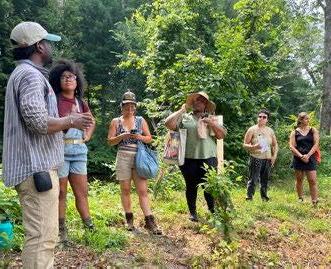
“At We The Land, I deeply held and companioned indigenous bodies, grieving bodies, bodies releasing immense stored trauma, bodies tense with carrying the weight of the world on their shoulders, bodies with the most wonderful root chakras that spilled forth the skill of their earthwork, trans bodies, bodies unsure of the next steps in their journeys but ready to walk or rest, bodies enlivened by what they had just learned or who they
Panel discussions examined cooperatives, collectives, and land trusts models, explored ways to advance Black liberation and Indigenous solidarity for Land justice, and welcomed members of the Indigenous Femmes Land Justice “Supergroup” for a discussion on Indigenous land justice, what “rematriation” means, and how sovereignty and co-management of land can coexist.
Strategy Labs provided an opportunity for various affinity groups within the more extensive NEFOC network to come together to organize and share strategies, and challenges faced within various microcommunities. These labs were interactive spaces honoring the intention and power of open-source collaboration, aiming to break the isolation of being farmers of color in the Northeast.
The HealRise Sanctuary was facilitated with the support and care of our team of skilled practitioners: Community Herbalist Taylor Rae Tate, Astrologer Lo Waters, Licensed Acupuncturist Taganyahu Swaby, Thai Massage Therapist Lindai Loutun, and Reiki Practitioner Zien Celeste. The space offered free healing sessions to support participants’ personalized wellbeing needs during the conference.
The Ceremonia and Community Altar Space, a liminal offering tucked away from the bustle of the gathering, was tended with the intention of creating pockets of stillness and moments of reflection within the larger gathering. The Ceremonia and Community Altar Space invited participants to gather, take pause, convene with ancestors of choice, offer prayers, and receive nourishment by way of Tobacco ceremony and limpia.
WEPA Translations, an ACTFL-certified mother-daughter team from San Juan, Puerto Rico, Margo de Torres and Vero González, provided simultaneous interpretation services in Spanish and English for the duration of the conference, sharing their love and commitment to language justice.
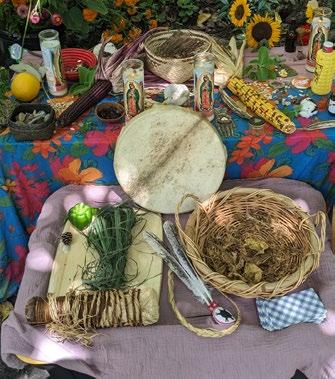
deeply connected with, bodies that bloomed brilliant mushrooms and deep red flowers, bodies with broad wings growing forth, bodies that were so ready to cry and be held. I simply was in awe of these beautiful beings and all that they brought with them. There were so many parallel stories and journeys. Everyone I shared space with on my reiki table had so much bodily wisdom and tenderness. Thank you so much for supporting a space where our folks can
practice loving our bodily wisdom and honoring the elements and energies that support our life.”
- Zien Celeste, HealRise Practitioner
“I feel so grateful to have been a part of We the Land! The gathering was such a needed space for all of us to gather to feel safe, celebrated, and seen. So much healing took place at We the Land!, and I hope we get to experience many more spaces like
We the Land! in the future. The programming was super engaging and thoughtfully curated. The food absolutely delicious and culturally relevant. I am holding gratitude that I was able to share my ancestral medicines, and continue the work of reclaiming our ritual, prayers, and sacred medicines.”
- Suanny Upegui, Ceremonia and Community Altar Space Healer

The ‘On the Way’ tour was a collaborative effort with the mission to support Black-owned farms and Black-led growing spaces in the Northeast. This initiative, inspired by the spirit of unity, community building, and empowerment depicted in Spike Lee’s Get on the Bus, which chronicled a collective pilgrimage to the historic Million Man March, took place from October 4th to October 18th, 2024.
The On the Way Tour drew on the legacy of collective action, emphasizing the need to address systemic challenges faced by Black farmers. Just as the Million Man March galvanized Black men to align with each other and support their communities, the tour sought to unite Black farmers, fostering collaboration and sustainable growth in the face of adversity. “My family was forced off their land during the Great Migration and displaced again in
Brooklyn,” recounts Jawhara Taitt, community member and traveler on the tour. Taitt says the urban farm on which she found her home “is one block away from where our old home used to be. I am reclaiming my heritage by doing earthwork and feeding my community.” Through hands-on projects, knowledge-sharing, and community-building, the tour strengthened connections across state lines and provided vital support to Black-led agricultural spaces.
“We were thrilled to embark on the ‘On the Way’ Tour to uplift the incredible work being done by farmers across the Northeast,” said Christine Hutchinson, Black Land Stewardship Cultivation Co-director. “This tour was not just about farming; it’s about building a community committed to sustainability and mutual support.”
The “On the Way” tour was more than just a series of farm visits — it’s a movement toward strengthening Black agricultural practices, fostering community, and continuing the legacy of self-determination and empowerment. Like many aspiring farmers, Angelica Vargas was seeking first-hand experience by traveling with
the “On the Way” delegation this Fall: “Being part of a team helping other Black farmers fulfill their land needs feels like a fast way to gain hands-on experience and see how other folks are meeting the challenges of being Black and Brown in rural environments,” says Vargas.
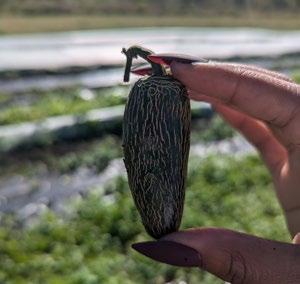
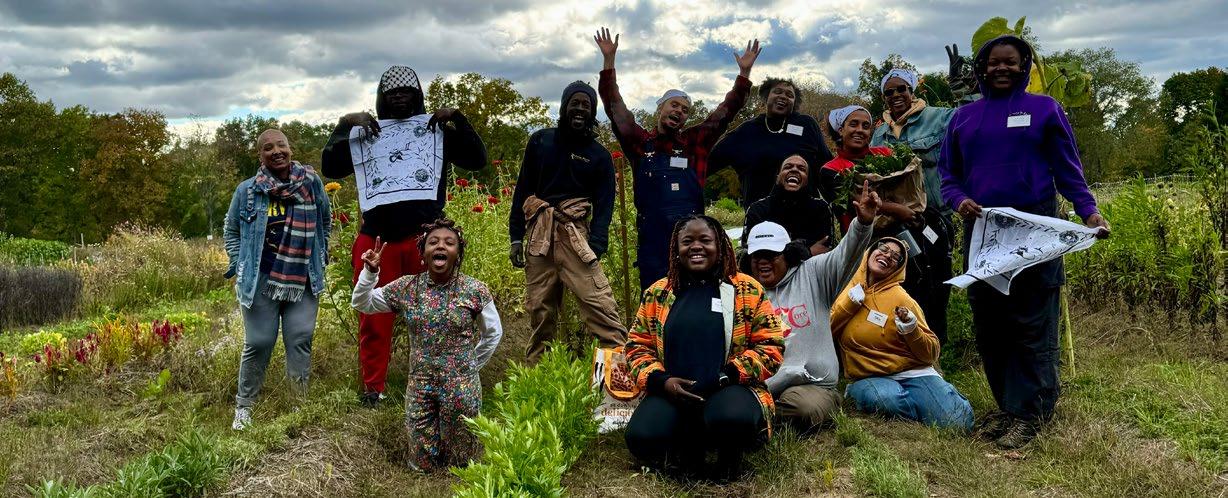
• Support Black Farmers: Offered hands-on assistance tailored to the specific needs of Blackowned farms, helping them overcome operational challenges and implement sustainable practices.
• Foster Community: Built relationships between Black farmers, strengthening ties and creating a regional support network.
• Promote Sustainability: Shared and applied regenerative farming techniques, ensuring longterm farm viability and ecological health via an improved knowledge pool.
• Hands-On Assistance: Participating farms received hands-on support from a team of new and experienced farmers to help with critical farm projects.
• Knowledge Exchange: Farmers engaged in valuable knowledge-sharing around best practices in sustainable agriculture.
• Community Building: The tour created opportunities to connect Black farmers, building a network offering ongoing support and collaboration.
• Enhanced Visibility: Participating farms gained increased visibility, raising awareness of their work and attracting community support.
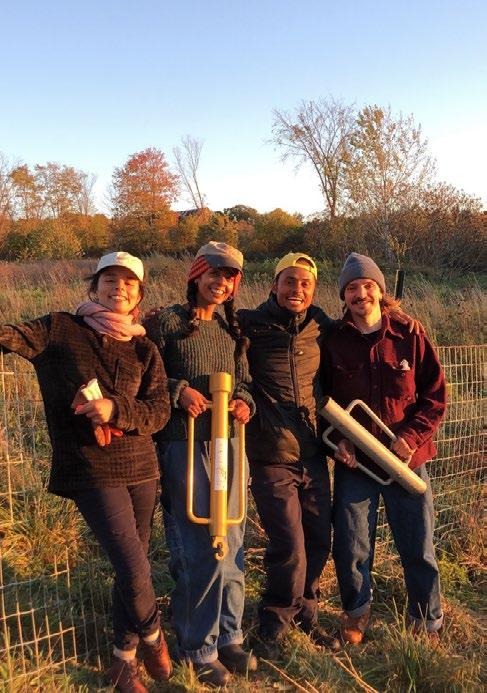
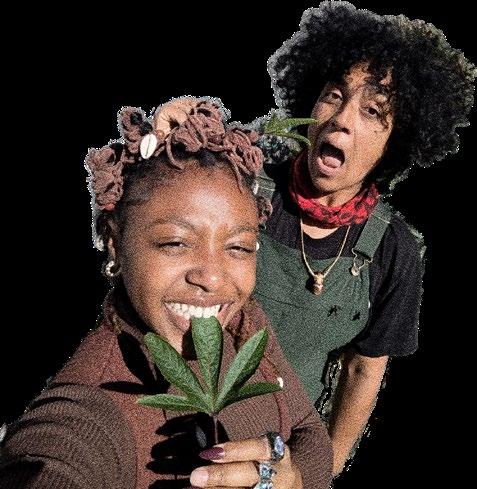

The Reparations Program has been methodically revitalizing our first land donation the North Thetford Church, over the last year, transforming it into the New Suns Community Center, a sanctuary for BIPOC community connections in Rural Vermont, which has been designated a “climate haven” for its potential to shelter populations displaced by the climate crisis. Vermont, despite its beauty and promise as a climate refuge, remains a predominantly white, rural state, where people of color often struggle to find safe and welcoming spaces.
The New Suns Community Center and the NEFOC-LT Reparations Program are led by Co-director Kenya Lazuli and Coordinator Shingai Njeri Kagunda. Unlike many traditional institutions, this physical space was created with the explicit goal of providing a home for BIPOC individuals to gather, connect, and grow together. New Suns offers a space where
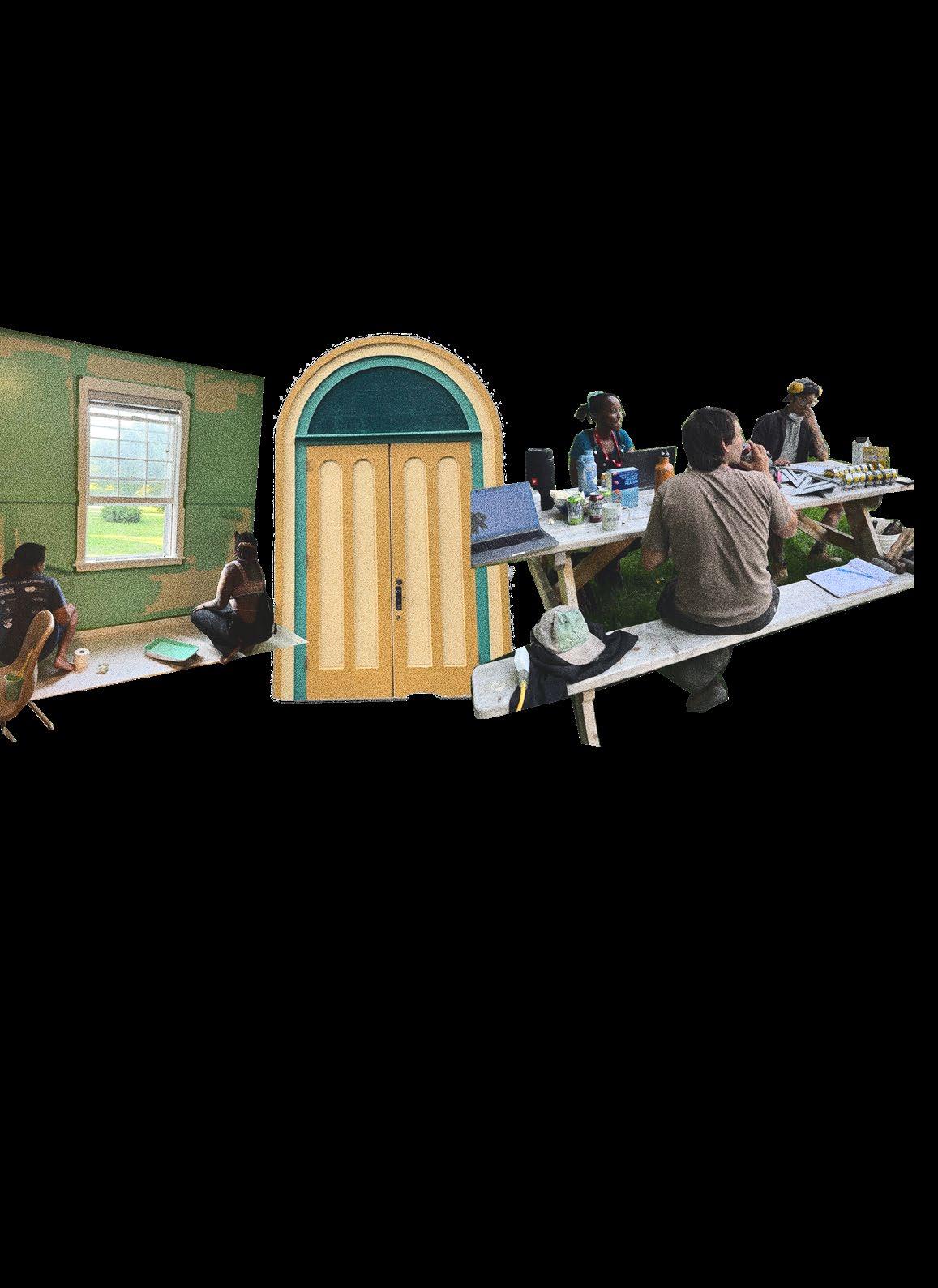
people of color can foster communitydriven connections and food sovereignty, addressing a critical need in a region where such opportunities are scarce.
With a large hall and stage, a separate sanctuary space with seating for 200, two kitchens, and several meeting rooms; over the last year we have cultivated and built a tool lending library, a community book library focused on themes of liberation, a community ceramics studio, and a future commercial-grade kitchen for local food entrepreneurs. The space is outfitted with all the necessary amenities to support community gatherings, workshops, and events.
In February, we hosted the Black Futures Film Festival, celebrating Black History with a curated array of Black films across time. Facilitated Q&A sessions slotted into the festival led to intergenerational conversations about the relationship between culture and Black
freedom movements.
Feeling the weight of being situated in a context that connects both intersectional oppressions and freedoms, we co-organized fundraisers for Palestine, including a homemade Pupusas sale led by ElSalvadoran community, and a community flea market where we raised over $3,000 dollars that was donated to UNRWA, Palestine’s Children Releaf Fund, Anera, and the Palestine Red Crescent Society. Additionally, we hosted Leila Hassan, a Palestinian Craftswoman, who sold jewelry, embroidery, and Hirbawi keffiyeh made by women widowed by settlercolonial violence in the West Bank. We have hosted solidarity reading groups that are a space for processing both the current active genocides taking place globally and the history of settler colonial violence and its relation to imperialism and land justice. Throughout the year, we have collaborated with different land justice
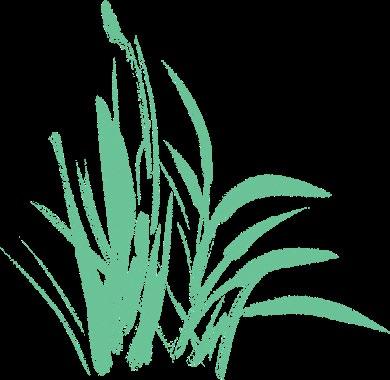
organizations, such as the RELEAF Collective, which centers BIPOC land access and food justice in Vermont. We hosted two RELEAF community dinners, where individuals from the community made asks and offerings to each other.
The expansion of the tool library has only been possible because of community support. In May we hosted a tool library volunteer day where community members volunteered to organize and itemize donated and grant-purchased tools, creating a system that streamlines the process of lending tools. In June, we collaborated with a volunteer carpenter who teaches free carpentry classes to marginalized communities while working on BIPOC land projects. Throughout June and July, we hosted a free six-week Summer Ceramics series, attended weekly by BIPOC community members from across the state.
We spent months organizing the New Suns Fall Festival in what is becoming different iterations of a yearly tradition. This year, we were able to work in collaboration with NOFA-VT. The festival, which happened in September, incorporated BIPOC farmer vendors and creatives who bartered, traded, and sold fresh veggies, food, and art pieces in celebration of the changing seasons. A live band performed reggae and soul music while attendees skated and danced in the spacious community center hall. NOFAVT brought their wood fired pizza oven and served over a hundred free pizzas to the community.
In early October, we hosted the Farm Force dinner and panel discussion in collaboration with Francine Miller, Senior Staff Attorney/Adjunct Faculty at Center for Agriculture and Food Systems Vermont Law and Graduate School. The
group was made up of a 26-member farmer delegation from the Virgin Islands, local agriculture and conservation professionals, community builders, and allies from around Vermont who all showed up for an incredible locally sourced dinner, including hickory nut milk from nuts the group had picked the day before at a stop on their 8-day tour.
The New Suns Community Center continues to be a pillar of support for the long-standing community of folks who donated the building to Every Town in December 2022. The congregation continues to meet weekly in the sanctuary for their Sunday service, and the Elder Network uses the community kitchen and hall as a gathering space for their monthly luncheon.
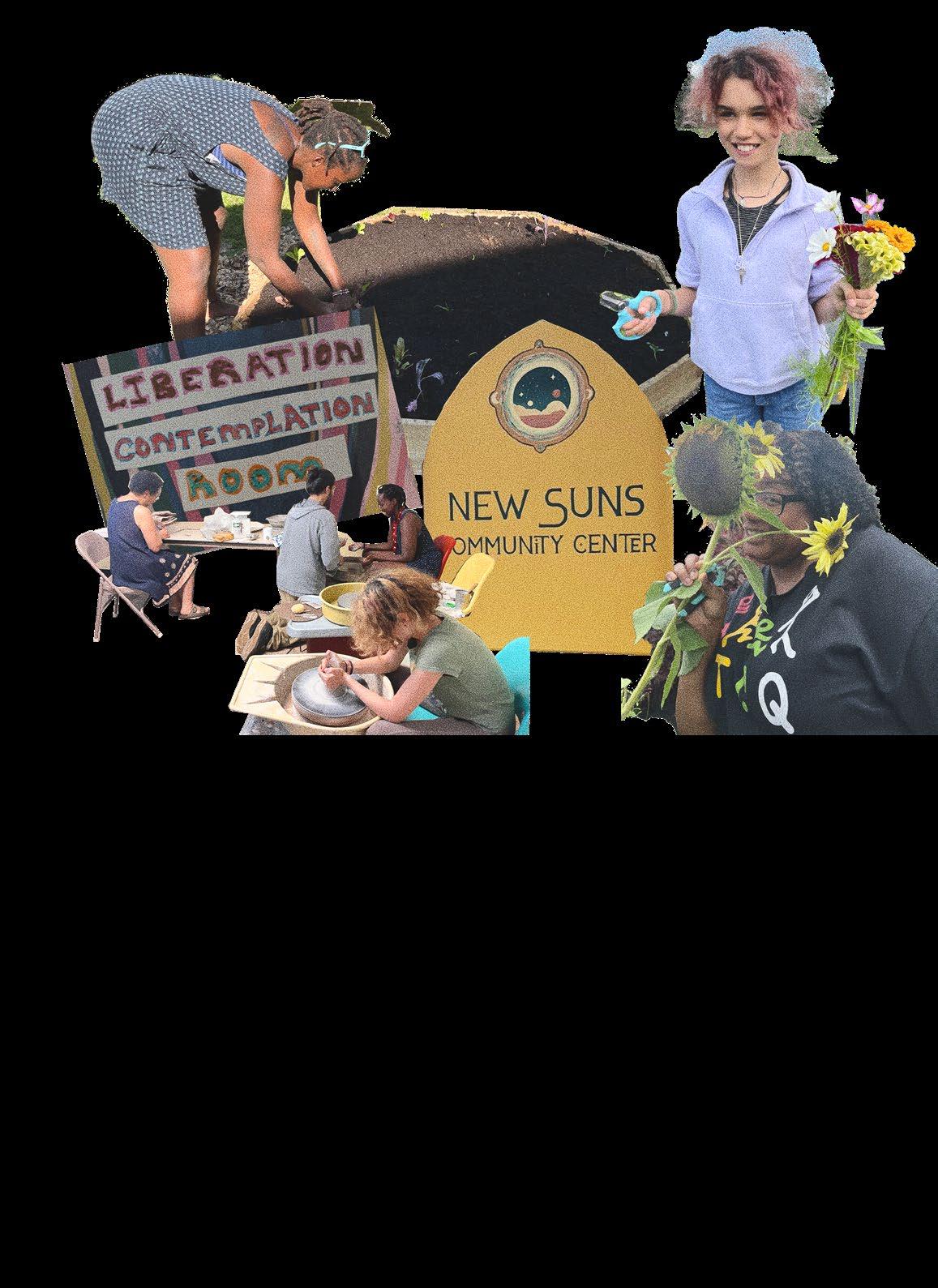
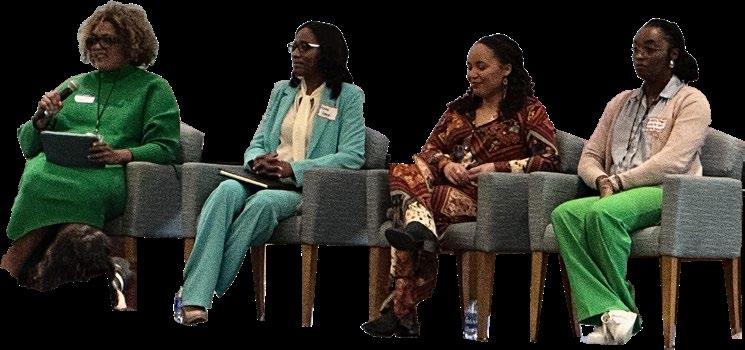
NEFOC’s Policy and Advocacy program focuses on state policy action in southern New England (Connecticut, Massachusetts, and Rhode Island). In 2024, these efforts were primarily directed at legislative action on land access, resources, and technical assistance for new and beginning BIPOC farmers, climate disaster relief, and Heirs Property rights.
In many states in the Northeast, farmland preservation programs and conservation easements remain significant tools to help with farm economic viability, prevent conversion of farmland to non-agricultural uses, and reduce the cost of farmland for new and beginning farmers. While these efforts have slowed the decline of small farms in the region, it has not fundamentally changed the trajectory of the industry.
In Connecticut, NEFOC is working with the Working Lands Alliance to update the state’s farmland preservation programs with newer tools like Option to Purchase at Agricultural Value (OPAV) and Buy/Protect/Sell (BPS) to help make farmland more affordable to new, beginning BIPOC farmers. In the region, conservation easements do
not guarantee that a protected farm is affordable to a new, beginning or BIPOC farmer. By adding OPAV to an easement, the landowner is required to sell the land to a qualified farmer at its agricultural value, which is typically significantly below market prices. Several states in the northeast use this tool to help reduce the costs of buying farmland, but this option does not exist in Connecticut. With BPS, an organization can purchase unprotected farmland to remove it from the real estate market. The organization can then apply for a conservation easement to recoup some of the initial purchase costs from state and federal farmland preservation programs. After the farm is protected, the organization can sell it at a reduced price to a farmer and recover the remainder of their initial investment. Because the approval process for conservation easements can take 2 years or more, BPS allows an organization to quickly acquire farmland under imminent threat of development/conversion and then preserve the farm for a farmer who otherwise couldn’t finance that purchase in time at its market price.
NEFOC’s Policy and Advocacy Program is also working
to find ways to protect, preserve, and support urban farms that are ineligible for state and federally-funded conservation easements due to the farms having contaminated native soils. In coalition with the Working Lands Alliance, NEFOC is advocating for funding a new program at the Connecticut Department of Agriculture that would allow a land trust to purchase an easement from an urban farm. By creating a state program that can grant funding to a separate entity, like a land trust, which would not be restricted by regulations regarding native soils, it would be possible for urban farms to sell a conservation easement and protect the land from development.
With other local organizations that support beginning farmers, NEFOC seeks to foster additional state programs that can have a greater impact on reversing the loss of farmland, improving agriculture viability, and making farmland more affordable to BIPOC farmers with limited financial resources. NEFOC opposes state regulations that do not protect prime and locally important agricultural lands from becoming utility scale solar generators. Current state regulations do not prohibit the development of utility scale solar on prime farmland. The Department of Agriculture can only recommend that such development not occur, yet the department has no power to enforce any restrictions (unless the land already has a conservation easement that restricts solar development). Competition with solar developers is increasing the farmland cost for everyone, making affordable access to land out of reach for BIPOC farmers.
In the legislative session that ended this past spring, NEFOC advocated for new legislation authorizing the Connecticut Department of Agriculture to create a new Option to Purchase at Agricultural Value (OPAV) easement program. Unfortunately, this bill did not pass. In the upcoming legislative session which includes the biennial state budget, NEFOC will continue advocating for funding for OPAV, Buy/Protect/Sell (BPS) and similar programs in coalition with other farm organizations.
Extreme weather-related crop losses fueled partly by climate change have occurred in the Northeast every year for the past several years. Farmers across the region are demanding financial assistance to cope. Unfortunately, existing federal crop insurance programs have proven to be woefully inadequate and ill-suited for the small, diversified and specialty crop farmers in our region. Since there is no bipartisan agreement on the federal Farm Bill, we are unlikely to see significant improvements in federal programs
soon. Thus, state governments are under enormous pressure to respond but have little capacity to act as crop insurance agencies. Moreover, they need more funding to address the increasing demand for disaster relief. NEFOC is working to advocate for climate-related disaster relief programs that are fair and equitable, especially given that most relief funds will support existing, larger operations instead of newer, smaller farms. NEFOC is also advocating against utilizing existing funding for state programs that support new, beginning, and BIPOC farmers and redirecting those funds to disaster relief. We do not wish to rob the future to pay for the past.
In Massachusetts, NEFOC supported state coalition efforts to pass legislation creating an equity commission for agriculture at the Massachusetts Department of Agriculture and Resources (MDAR). Unfortunately, this bill also did not pass in the last session. However, we remain hopeful that we have sufficient support in the legislature and current administration to pass it in the upcoming session. Massachuestes (and several other states in the region like Vermont) already have programs like OPAV and BPS, and there was legislative success this year and last year to raise significant funding for a climate disaster relief program available to farmers. However, more work needs to be done to help new, beginning and BIPOC farmers get access to land and financial resources. A state agriculture commission on equity would address these issues.
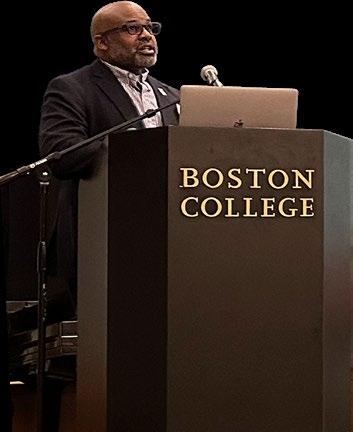
Lastly, NEFOC recognizes that Heirs Property has played a major role in the long history of dispossessing Black farmers of their land. While most of this has occurred in the South, there are instances all around the US. Legal protection against some of the worst abuses of heirs property exists in the Uniform Partition of Heirs Property Act (UPHPA). Connecticut, New York and Maryland are the only states in the northeast where the Uniform Partition of Heirs Property has been enacted into law. In 2024, NEFOC participated in the annual Conference on Heirs Property and Racial Wealth Gap hosted by Boston College Law School, and NEFOC has joined with the Massachusetts UPHPA Coalition to help move UPHPA legislation forward in MA, RI, and NJ. In these states, we are currently seeking BIPOC members in our network who may be impacted by heirs property and are willing to testify in the state legislature in support of the UPHPA. NEFOC encourages all members in these states to speak with their local state representatives about the importance of heirs property and the UPHPA.

In 2024, the Land Network Services team hosted a multilingual virtual gathering for our 700+ network of members for the second year in a row, where we fostered connection and collaboration within our NEFOC Network community. This year we shared our NEFOC land relationship model and philosophy, offering insights into our programming and opportunities. Through this virtual gathering, network members had the chance to build meaningful connections with each other, centered around their farm, land, or food work. Additionally, members shared updates on their journey, the challenges they face, and expressed their needs.
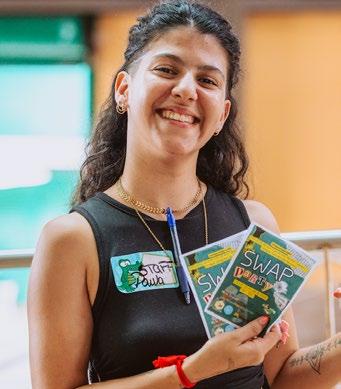
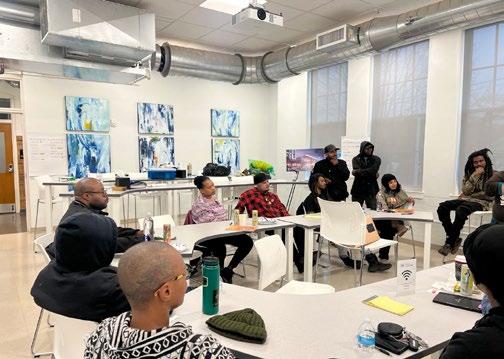
In 2024, we welcomed Vashti, Héctor Itzcuautil, Esvin, and Paola to our second cohort of La Beca. Collectively, they are leading agricultural projects from Puerto Rico to Pennsylvania, working towards food sovereignty for their communities.
La Beca’s offerings, including a $50,000 stipend, mentorship and professional development opportunities, are helping La Beca participants start or upscale their
agricultural projects. Esvin in Pennsylvania and Vashti in Puerto Rico will leave their jobs as farm workers on dairy and ecotourism farms, respectively, to work fulltime to launch their agricultural businesses. At the same time, Paola in Puerto Rico and Héctor in North Carolina are focusing on scaling up their projects La Compostera and Hawk’s Nest Healing Garden.
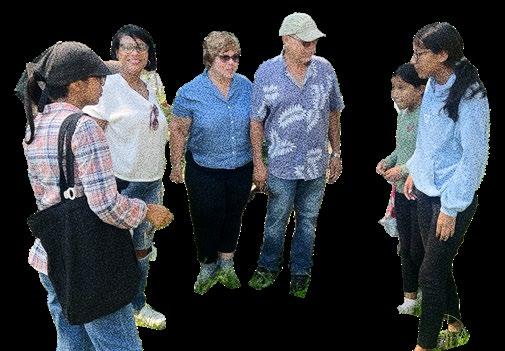
The purpose of the Farmers and Farmworkers Listening Sessions was to engage 150 BIPOC farmers and farmworkers across the Northeast, with the goal of understanding their challenges, needs, dreams, and to deepen relationships, ultimately fostering mutual support and advocacy for systemic change. A central focus of the sessions was to build meaningful, trusting relationships with BIPOC farmers and farmworkers, breaking the isolation that many feel, and cultivating a sense of community.
A questionnaire guide was initially drafted in English and then translated into Spanish and Creole to facilitate these confidential conversations. Interpretation and translation services were provided in respective native languages for participants, ensuring language accessibility.
The sessions aimed to answer two key questions:
What are the experiences, challenges, and successes faced by participants?
What can NEFOC learn about the needs and dreams of BIPOC farmers and farmworkers to strengthen relationships in the region?
The initiative gathered valuable insights into the lives and work of farmers and farmworkers across the Northeast, including Delaware, Connecticut, Maryland, New York, Pennsylvania, and West Virginia. Key findings from the sessions include:
Participants shared common dreams, including owning homes or farms, securing education, building generational wealth, owning land, accessing healthcare, affordable housing, workers’ compensation, livable wages, and achieving stability for their families. The values of respect, honesty, family, and faith were strongly emphasized across the group.
Participants faced significant challenges, such as language barriers, lack of labor protections and unsafe working conditions, inadequate support services for small-scale farmers, limited funding, and difficulties navigating the grant process. LGBTQ+ participants reported feeling unsafe in farming environments and highlighted difficulties accessing veterinary care.
There was a widespread call for more accessible funding (grants, loans, scholarships), bilingual services, and improved job opportunities, particularly for older adults and small farmers. Additionally, there was a recognized need for better access to information, delivered in a way that is easily understandable and accessible to farmers and farmworkers.
During the listening sessions, participants expressed their gratitude for being heard, appreciating the safe space to share their experiences without fear of repercussions. Many were excited to learn that organizations like NEFOC are actively working to bridge the gap between them and the community resources they need, fostering a sense of hope and connection for the future.
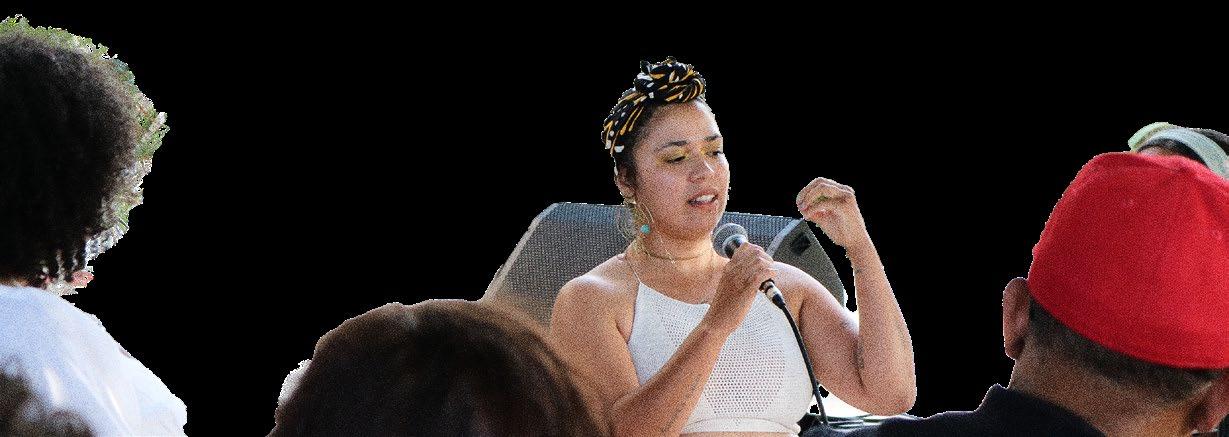
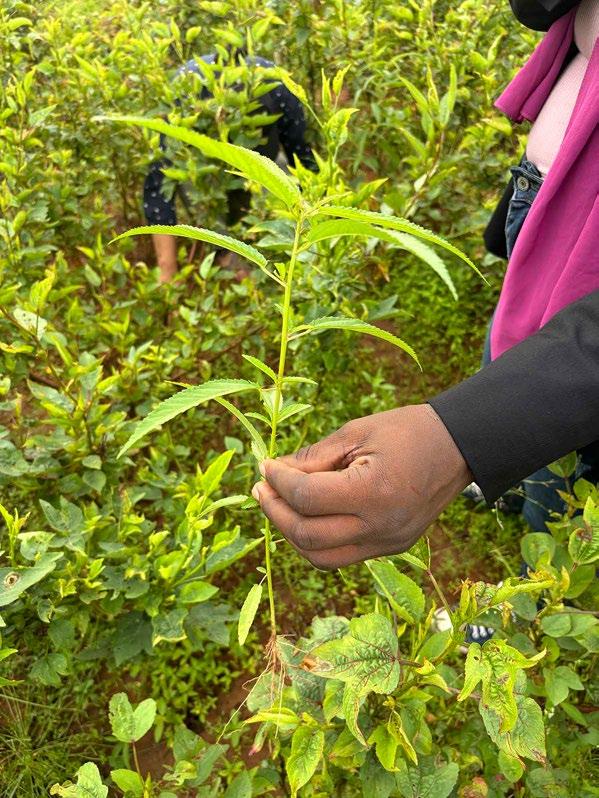
Over the past year, the Climate Justice & Advocacy program has prioritized reclaiming climate justice narratives and mobilizing resources to support Black, Indigenous, and other people of color climate stewards. Many of the farmers who have experienced land loss, structural marginalization, and systematic discrimination over time have long been on the frontlines of climate stewardship, enacting practices that revitalize ecosystems, protect biodiversity, and foster
balance in the spaces of interchange and breath between soil and sky, now known as the climate. These program focus areas aim to demystify, concretize, and galvanize collective action around a decolonized climate stewardship that draws on ancestral ecological practices in the spirit of self-determination and agency for land stewards of color, emphasizing their vital roles as solutionary agents of change in the age of growing climate crisis.
Our efforts to create gathering spaces of mutual exchange and narrative shifts around these themes have included:
Representing NEFOC in the newly formed Northeast Climate Disaster Relief coalition, with the goal of bringing a justice lens to the continued needs assessment and development of collaborative programs focused on emerging and climate crisis resource gaps
Developing a 2025 Climate Stewardship Cohort that will engage Black, Indigenous, and people of color farmers and land stewards from the Northeast region in a community of practice focused on:
1) Reclaiming narratives and practices of climate stewardship, biodiversity conservation, soil health restoration, and ecosystem rights, sharing these through mutual exchange, support networks, and peer learning sessions; 2) Supporting stability and longevity of reciprocal land relationship as essential pillars of climate resilient and mediating land stewardship practices; 3) Proposing climate justice and advocacy measures that present vibrant alternatives to the more widely known corporatized “false solutions” to climate change; and 4) Developing and promoting more culturally relevant, holistic, and ecosystem-centered metrics for gauging the climate stewardship impacts and roles of key practices.
Mobilizing resources to support climate stewards
Exchanging cosmologies and practices of climate stewardship with farmers in the U.S. and Global South, as well as Indigenous migrant farmerled assemblies and power building gatherings
Sharing, through public speaking and panels - including a Washington DC summit panel in the leadup to the U.S. election emphasizing shifting carbon framing - farmer stories that highlight alternatives to the limited, transactional, and coloniallyframed schemes for incentivizing and supporting land stewardship, that instead prioritize care for the climate and value the climate stewardship roles of the Black, Indigenous, and other farmers of color who make up our communities
Acting as a bridge between on-theground knowledge and the USDA and other Federal Climate Action programs through developing concrete supports for Indigenous and other culturally relevant regenerative farm practices to mitigate climate change, increase climate resilience, and protect ecosystems.
Collaborating with NEFOC network members and other BIPOC farmers to develop quantitative and qualitative metrics that are accessible, relevant, and appropriate for small-scale land stewards practicing traditional ecological methods
Weighing in via a farmer pre-forum on key topics relevant to the Farm Aid festival, which hosts hundreds of attendees annually
Continuing to channel the voices and needs of our farmers into policy platforms, while advocating for the Farm Bill to prioritize climate justice and action needs of Black, Indigenous, and other land stewards of color and to center real climate solutions
Promoting culturally relevant approaches to climate resilience and stewardship that draw on our own ancestral cosmologies, traditional ecological knowledge, and shared practices, while addressing the unique technical needs of farmers practicing integrated soil health tending, and farmers’ growing needs for information about climate resilient and climate-friendly methods.
Nurturing local, regional, national, and international relationships with sibling and allied organizations and coalitions building climate justice campaigns, with explicit focus on land rematriation and sovereignty for Indigenous people, reparations for Black land stewards, food sovereignty, migrant justice, and ecosystem rights
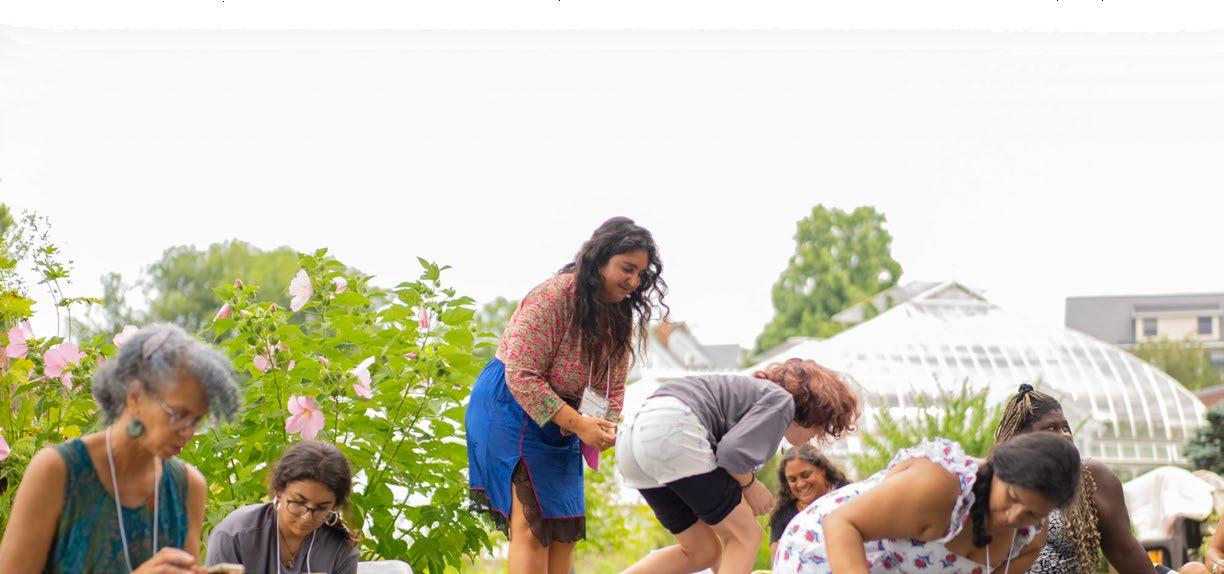

Millerton, NY
WILDSEED is a sanctuary in New York’s Mid-Hudson Valley, where BIPOC leadership fosters community healing, land connection, and ecological balance. Established as a reparative gift in 2015, it’s a space for growing food, medicine, and relationships through sustainable, justice-driven economies. From agro-ecological farming to transformative justice initiatives and youth programs, WILDSEED blends healing and skill-building for collective resilience. In partnership with NEFOC, the land is transitioning into a trust, preserving it for future generations and strengthening a vision of shared responsibility, solidarity, and liberation.

North Thetford, VT
Welcome to New Suns! Nestled in North Thetford, Vermont, this vibrant community center transforms a historic church into a sanctuary for BIPOC connection and resilience. Designed as an inclusive space for gathering, learning, and thriving, New Suns offers resources from a tool library to a future community ceramics studio. Rooted in food sovereignty, climate resilience, and justice, it’s a hub for healing and connection in rural Vermont. Join us in shaping a future of equity and togetherness –here, everyone belongs.
Buffalo, NY
Ubuntu Farm, formerly Common Roots Farm, is an urban sanctuary in Buffalo’s Broadway Fillmore district, addressing food apartheid with community-driven food sovereignty. Established in 2012, this farm produces fruits, vegetables, and herbs using sustainable, low-till practices. Now in transition, the new farmer is eager to invest in the cooperative food system of Buffalo’s East Side, fostering regenerative farming, climate resilience, and community empowerment. With support from NEFOC, Providence Farm Collective, and Buffalo Go Green, Ubuntu Farm is reclaiming access to food, land, and justice for Buffalo’s communities of color.

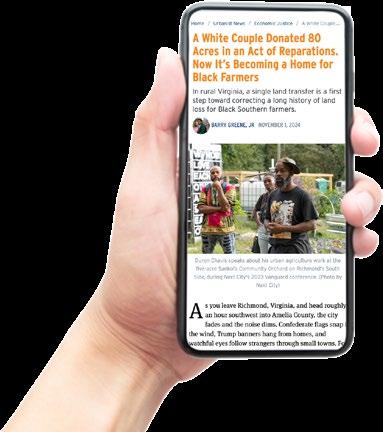
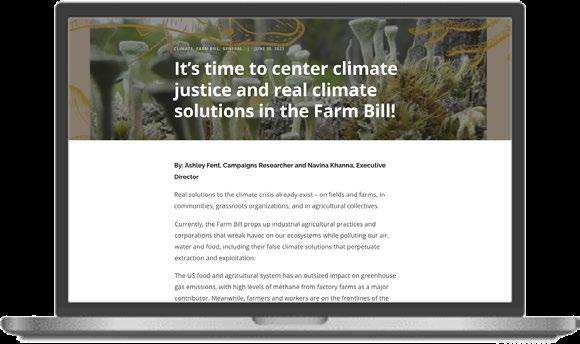
Op-ed: Farmers of color need climate action now. The farm bill is our best hope
• JD Vance Funded AcreTrader. Here’s Why That Matters
• Erica Dawn Lyle and Vice Coole to release physical copies of ‘Land Trust: Benefit for NEFOC’
• Seeds Are the Epitome of Spring’s Unlimited Potential
• Hochul Announces $14.7 Million to Improve Food Supply Chain
• It’s time to center climate justice and real climate solutions in the Farm Bill
Free The Land: How we can fight poverty and climate chaos, by Audrea Lim
• It’s time to center climate justice and real climate solutions in the Farm Bill!
• State Ag Department Announces $4.25 Million to Support Beginning And Disadvantaged Farmers
• NYS announces $4.25 million in grants for beginning and disadvantaged farmers
• A White Couple Donated 80 Acres in an Act of Reparations. Now It’s Becoming a Home for Black Farmers
• State Agriculture Department announces $4.25 Million for farmers


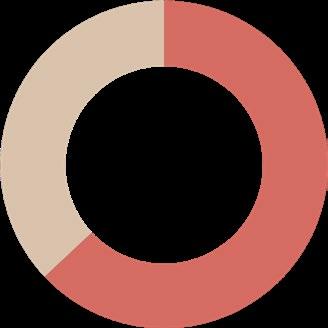
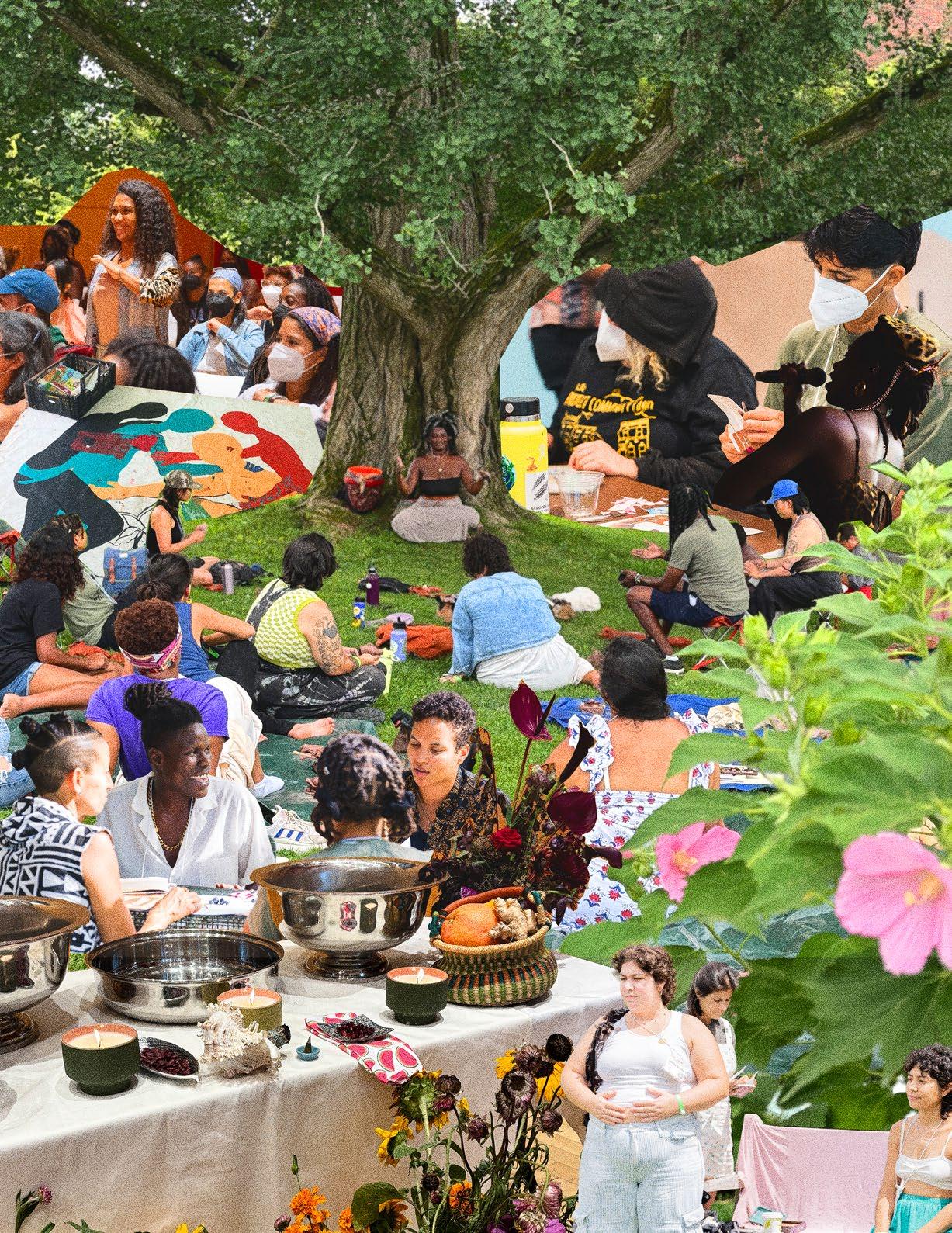

A SPECIAL THANK YOU
The work we do at NEFOC would be impossible without the radical and generous support from our community members, donors, sponsors, and organizations, who have consistently shown up and contributed to our mission. Your support is the life-giving fertilizer that catalyzes and nourishes our efforts. From providing holistic technical assistance to farm workers, advocating for public policy shifts that support agricultural labor rights,
securing permanent land tenure for Indigenous, Black, Latinx, Asian, SWANA, and PoC farmers in the Northeast, to building relational bridges of reciprocity with Indigenous communities and collectives, the work we do is inextricably tied to your encouragement and contributions. Thank you for trusting us and our vision for a re-storied and rematriated future.


“WHEN WE GIVE CHEERFULLY AND ACCEPT GRATEFULLY, EVERYONE IS BLESSED.”
–Maya Angelou


